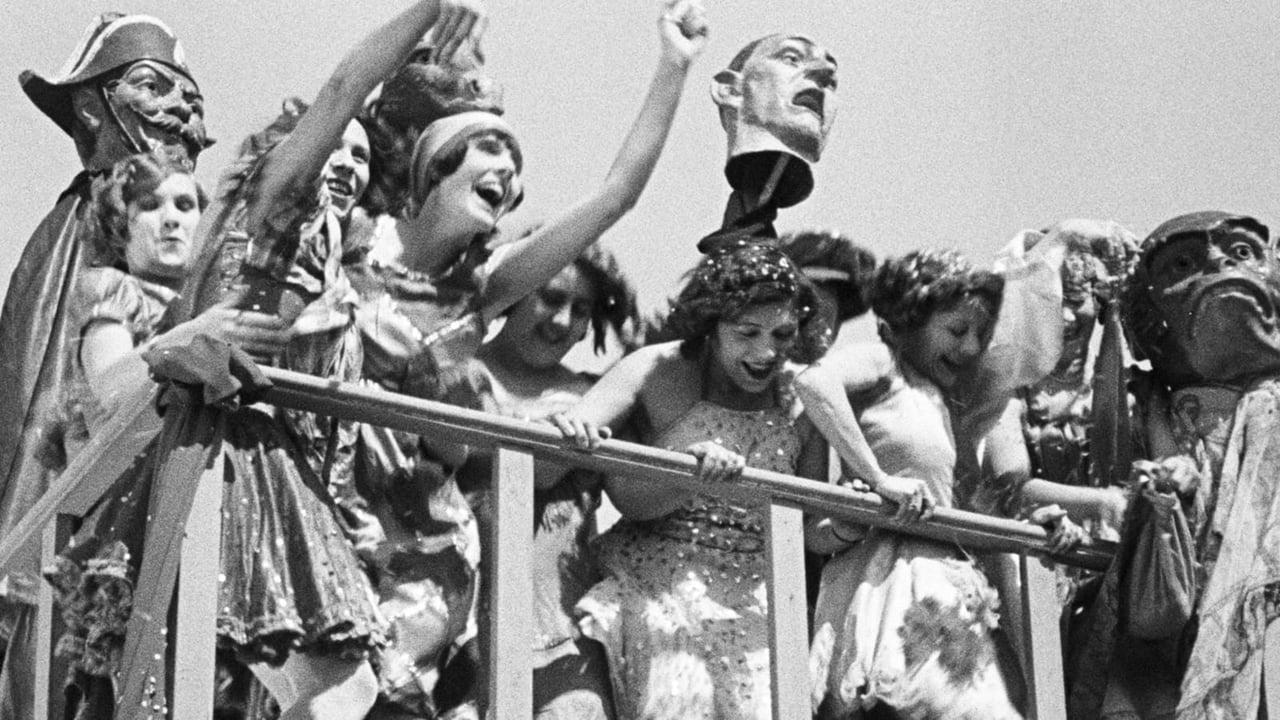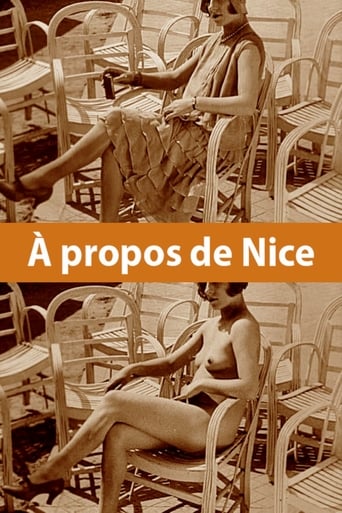



I like the storyline of this show,it attract me so much
View MoreIt's a mild crowd pleaser for people who are exhausted by blockbusters.
View MoreIt was OK. I don't see why everyone loves it so much. It wasn't very smart or deep or well-directed.
View MoreThe movie really just wants to entertain people.
What starts off as a conventional travelogue turns into a satirical portrait of the town of Nice on the French Cote d'Azur, especially its wealthy inhabitants.This is a subversive silent film inspired by Bolshevik newsreels which considered social inequity in 1920s Nice. Vigo himself said, "In this film, by showing certain basic aspects of a city, a way of life is put on trial... the last gasps of a society so lost in its escapism that it sickens you and makes you sympathetic to a revolutionary solution." Historically, the film is interesting not just for its class commentary, but for the involvement of Boris Kaufman, who was a virtual unknown before working as a cinematographer on "On the Waterfront" (1954).
View MoreEven that Jean Vigo's production is one of the smallest ones in the history of cinema, many film historians see him as one of the greatest filmmaker ever lived. He only had the time to make four films before his death in 1934, two of them are very well known. Zéro de conduite: Jeunes diables au collège (1933) and L'Atalante (1934), the latter is often seen as the most beautiful film ever made. It's also his only full lenght film. The other two films by him are a bit more rare, a documentary about the winning swimmer, Jean Taris: Jean Taris, Swimming Champion (1931) and his first film À propos de Nice (1930). The film is about a French coastal town - it is amazing how someone cann tell everything in less than a half an hour.It's hard to picture anyone else to make this film, but Jean Vigo. He knows just where to put the camera and when. À propos de Nice is a very intense portrait of a city, colored with black humor. It basically shows social injustice that lies in the city of pleasures. There are many lyrical realizations in À propos de Nice, for instance the gambling, the sea and the shore. The documentary plays very beautifully like a poem, like Francois Truffaut has said "Jean Vigo effortlessly reached poetry". But the lyricism isn't the only poetic thing in À propos de Nice, it has also got poetic realism and surrealistic visions.The gambling shown in À propos de Nice is actually very interesting, why is it shown? I've read somewhere interpretations, which say that it shows the economical order, which is based on coincidence, cheating and inhumanity. The antithesis of the richness and poverty is one of the most interesting things in this film. Somewhere in the city people crafts products with their hands, they still have the touch to their products to their work. But then Jean Vigo shows the other side, the Nizza of gambling places and carnivals, where the moral and mental death lies.
View MoreIf you're not awake for it A Propos de Nice could be a little boring, or just a little tiresome. There's no real specific 'point' to the visual, silent documentary that is Jean Vigo's first film, though what is and what isn't shown does strike some interest, along with some other miscellaneous images. It starts off with a spellbinding (and for the time revolutionary) image though, of the city of Nice seen from an angle high above in a plane. From there Vigo shows the upper class life, the vicariousness, the fun (driving cars, swimming in the ocean, going to nice restaurants, dancing), and then the film ends with a strange mix of images of smoke and fire and smokestacks and people laughing in close-up. The best thing about this short film is that there's a free-form approach to getting the city. It's part of what were called the 'city symphony' documentaries, where filmmakers just took there cameras around the city, getting images that delighted, or shocked, them. The film goes by with some strange camera moves, some low-angle perspectives of women doing the 'can-can', and more smiling. But probably the most provocative (and my favorite) image of the film is when there is a woman's body on a chair, we see her in different pieces of clothing, until she's nude. Is this surrealist, or just experimenting in form? It's not like a Bunuel film, for example, because it's more about getting the scenery and shapes of the buildings in Nice than outright provoking the audience. But on the other hand, there is a mix of Freudian, lightly surreal qualities to the film that I appreciated greatly, as were in a few independent filmmakers at the time. It's both exhilarating and a little dull- with the wrong soundtrack (I saw it with a common baroque score) its interest swings depending on the moment. If I can find it, I'd watch it again, especially after seeing more of Vigo's works.
View MoreI first saw this as part of a school film study in 1960. THEN as I recall, I merely saw a creaky old French travelogue highlighting more or less a day in the life of a town on the French Cote D'Azur that bore less relevance, to ME at least, than the rather staid and somewhat uninspiring biscuits named after it!I saw A PROPOS DE NICE again some forty years later at a lowly patronised French Film Festival which had been hurridly organised apparently by Sydney University. What I saw THAT night, with the advantage of four decades of life's experiences, was a superbly constructed attack on, or should I say "de-construction" OF - the Bourgois. Vigo, himself an anarchist to his left femur, relentlessly piles on the satire with images of the "respected" upper-class acting anything but respectfully. Innovative indeed was the cinematography from Boris Kaufman with intentionally tilted aspects of buildings to lessen their grandeur, use of shadow and striking images of the people (love the Brit tourists nursing their fish and chips) as they go about their daily business.Essential viewing for students of early French cinema.
View More